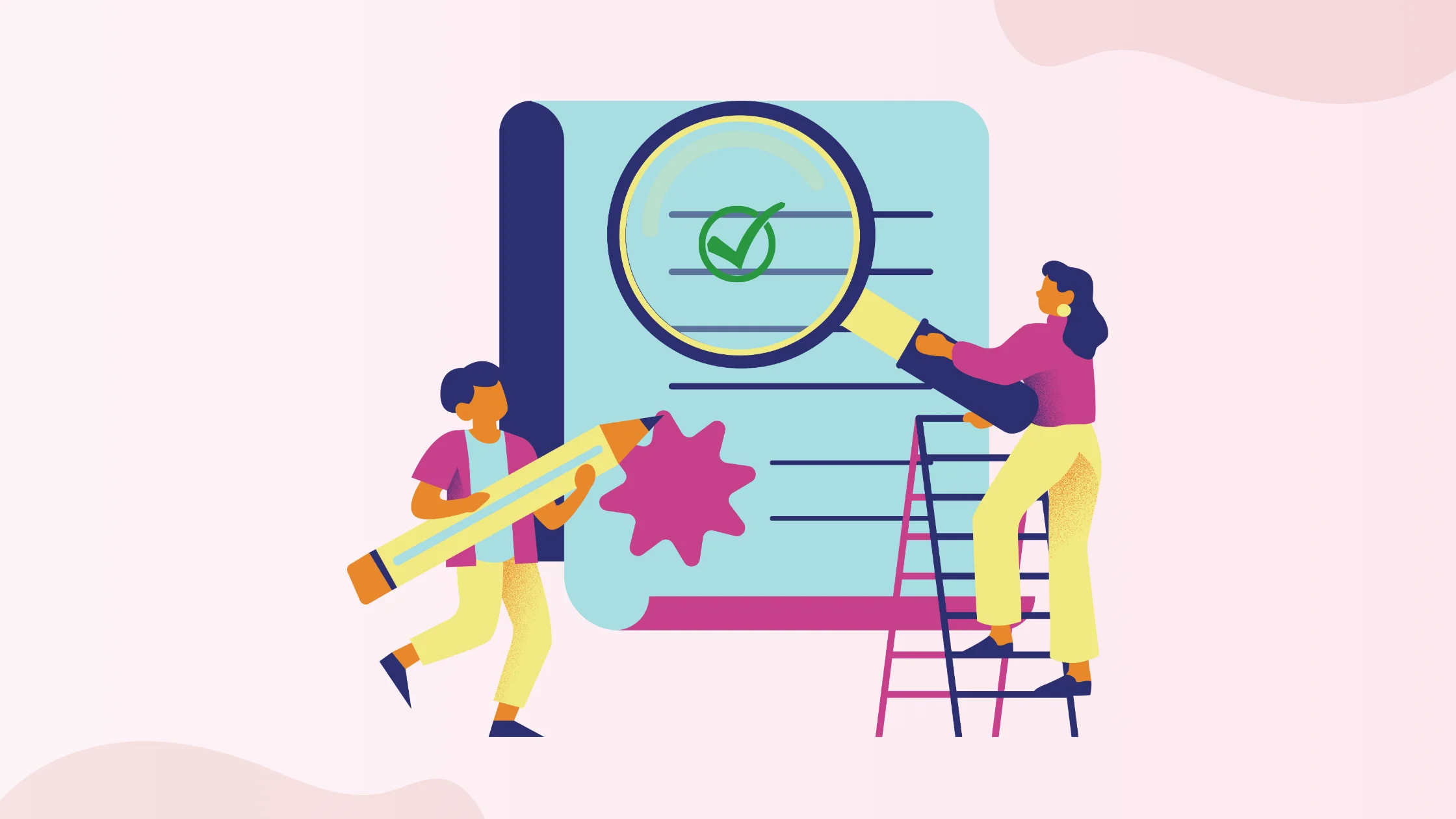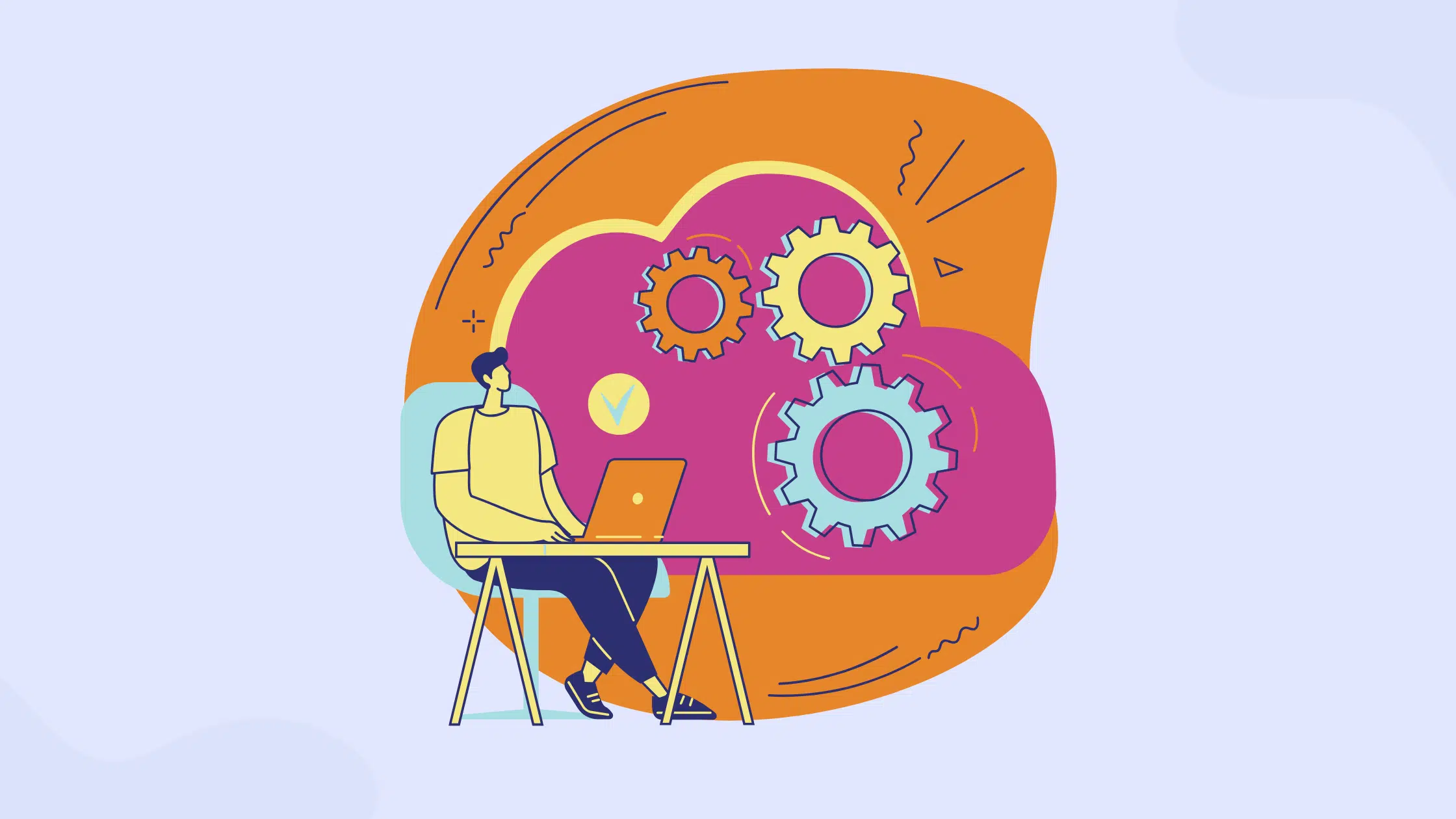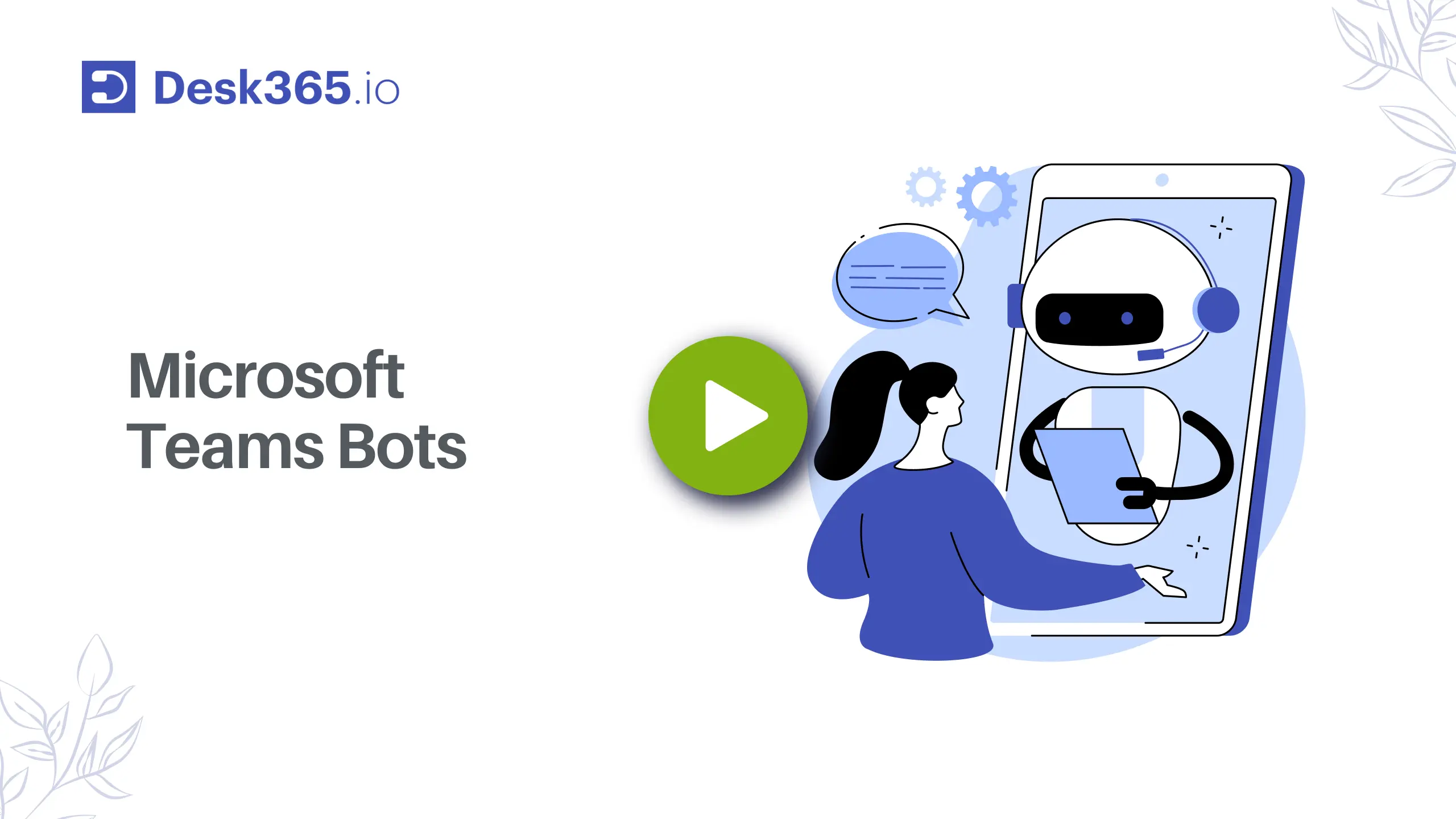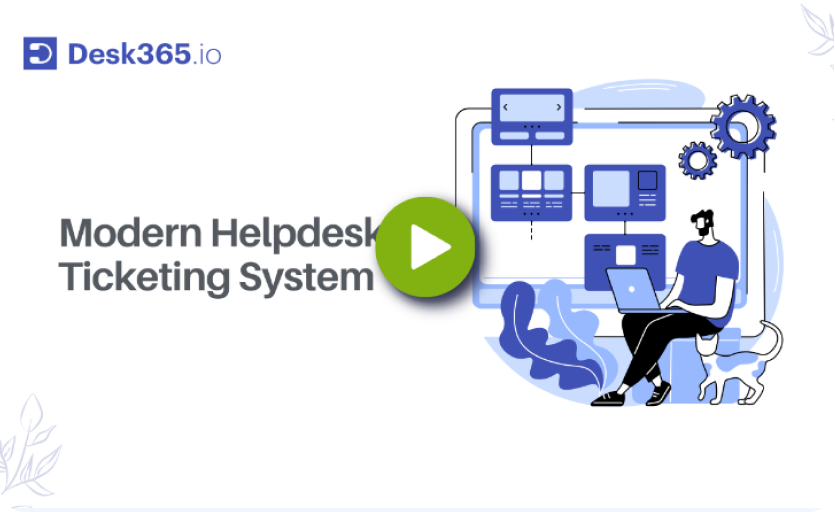Helpdesk software is essential for businesses aiming to maintain customer satisfaction in today’s fast-paced world where customers expect swift responses. According to a survey conducted by JeffToister 88% of customers expect a reply within an hour, so the pressure is on for companies to deliver exceptional customer service.
However, with numerous features available in the helpdesk ticketing system, finding the best helpdesk software can feel like searching for a needle in a haystack. The key is to identify right helpdesk software features that streamline processes and enhance customer support.
To ensure you select the best helpdesk software for your needs, it’s crucial to understand the essential features it should offer. Having the best features in a single helpdesk can help you improve support efficiency and provide customers with exceptional service.
What is helpdesk software?
A helpdesk software is a ticket management system designed to facilitate effective workflows in addressing customer inquiries and issues. It functions by organizing and tracking the support tickets generated by users, ensuring that each ticket is promptly addressed by the appropriate agents or departments within the organization.
Additionally, helpdesk software enables the generation of detailed reports, providing insights into ticket resolution times, agent performance, and overall customer satisfaction levels.
The primary objective of the right helpdesk software is to elevate customer satisfaction levels, ideally achieving a score close to 100. But, how to achieve it? It all depends on the ability of the helpdesk software to centralize and manage ticketing via omnichannel communications, automate routine tasks, optimize the agent response time, and a lot more.
Recommended Reading – How to Set Up a Help Desk: A Step-by-Step Guide and Checklist
Why is it important to have a helpdesk software?
Investing in helpdesk software helps you create a better customer experience. The helpdesk software helps you customize and make changes according to the customer’s journey.
It helps you manage your inbox by prioritizing customers. Investing in helpdesk ticketing software not only improves the efficiency of support operations of your customer support team but also contributes to overall customer satisfaction by enabling personalized interactions and efficient management of customer inquiries.
14 key features your helpdesk software should include
In today’s dynamic market, there are n number of helpdesk software options available, each striving to adapt and evolve to meet the ever-changing needs of businesses.
With so many tools offering loads of features to look at, it’s easy to become overwhelmed by the sheer complexity of available options. However, it’s important to recognize that not all helpdesk software features are equally beneficial, and adding unnecessary complexity can hinder rather than enhance your customer support efforts. Instead, the key is to identify the helpdesk software that aligns with your specific needs and objectives.
To determine the most suitable helpdesk software solution for your organization, it’s essential to engage in open discussions with your support team.
By collaborating with your team members, you can gain valuable insights into the specific challenges and requirements of your customer support operations. This collaborative approach allows you to prioritize helpdesk software features that address your unique pain points and streamline your workflows effectively.
To make the process of selecting your helpdesk software simpler we recommend you start by considering the below must-have features in a helpdesk software:
- Unified inbox
- Centralized user-friendly interface
- Omnichannel support
- Security
- Customization option
- Multi language support
- Self-service portal
- SLA’s
- Automation
- Notifications
- Canned responses
- Third party integration
- Knowledge base
- Reporting
1. Unified inbox
A unified inbox serves as an important helpdesk software feature for businesses focused on providing seamless customer support across multiple channels.
This feature offers a centralized platform where numerous agents can efficiently access and manage incoming tickets from various communication channels. By consolidating all customer inquiries into a single location, a unified inbox facilitates collaboration among support teams and ensures a cohesive approach to addressing customer needs.
The primary advantage of a unified inbox lies in its ability to prevent any customer inquiry from slipping through the cracks. By gathering communications from email, chat, web forms, and other channels in one place, businesses can guarantee that no customer inquiry goes unanswered.
This streamlined approach not only improves response times but also enhances overall customer satisfaction by providing timely and consistent support across all channels
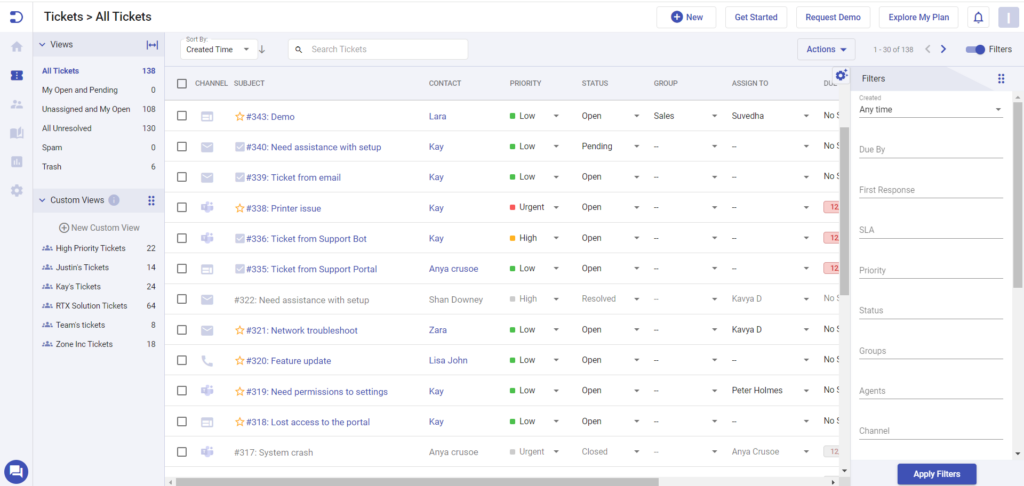
2. Centralized user-friendly interface
A helpdesk software with a centralized and user-friendly interface brings forth numerous benefits for businesses and their support teams.
Firstly, it offers agents a comprehensive view of all support tickets, enabling them to prioritize and manage tasks with efficiency and precision. By consolidating ticket management into one platform, agents can seamlessly navigate through tickets, ensuring no inquiry goes unnoticed or unresolved.
Moreover, the user-friendly interface plays a pivotal role in enhancing the overall user experience by helping users quickly familiarize themselves with the helpdesk software features. This fosters productivity and confidence among agents, enabling them to focus more on providing excellent customer support rather than struggling with complex interfaces.
3. Omnichannel support
Omnichannel support centralizes various support channels within the helpdesk software, enabling businesses to interact with customers seamlessly across multiple platforms. Whether it’s email, phone, chat, web forms, or even web widgets, businesses must be accessible through channels that customers prefer.
By consolidating communication channels, businesses gain visibility into the entire customer journey, regardless of the channel used. This holistic view allows agents to understand each customer’s interactions across different platforms, providing valuable insights into their preferences and behaviors.
4. Security
Data security is of utmost importance for businesses entrusted with sensitive customer information. Prioritizing security features within helpdesk software is essential to instill trust and confidence in customers while mitigating potential risks associated with data breaches or unauthorized access.
Helpdesk software should encompass basic security features to ensure the protection of customer data. This includes measures such as encryption protocols, access controls, and secure authentication methods to safeguard sensitive information from unauthorized access or malicious attacks.
5. Customization option
The key aspect of customization is the ability to add your company’s logo and branding elements to the helpdesk interface. By incorporating your logo and brand colors, you can create a cohesive and branded environment that reinforces your company’s identity and strengthens brand recognition among customers.
Furthermore, customization options extend to contact forms and ticket submission pages, allowing businesses to tailor these components to collect specific information relevant to their support process.
This could include custom ticket fields for capturing additional details about customer inquiries or specific requirements, enabling businesses to gather valuable insights and provide more personalized support.
By leveraging customization options, businesses can interact with customers at a personal level, creating an excellent customer service experience that aligns with their brand identity and values.
6. Multi language support
Amongst the key features, one of the crucial requirements for a helpdesk ticketing system is the ability to support multiple languages effectively. Multi-language support ensures that businesses can provide customer support in the language preferred by their customers, thereby enhancing accessibility and inclusivity. By offering support in multiple languages, businesses can effectively communicate with customers from different regions and cultures, providing good customer service and fostering better understanding and rapport.

When choosing the right helpdesk system, it is imperative to ensure compatibility with multiple languages to meet the diverse needs of customers. This includes features such as multilingual interfaces, translation capabilities, and support for language-specific content, ensuring seamless communication and support interactions across language barriers.
Read more: Changing the language in Desk365 Support Bot
7. Self-service portal
A self-service portal stands as an asset for businesses aiming to enhance customer support efficiency and satisfaction. This feature empowers customers by providing them with the tools and resources to independently find information and resolve issues. A self-service portal typically offers:
- Interactive FAQ section where customers can find answers to commonly asked questions. This section is accessible both within the helpdesk platform and to customers directly.
- Knowledge base articles where customers can access a repository of knowledge base articles aimed at educating and guiding them on various topics. These articles cover a wide range of subjects and are designed to provide comprehensive information to users.
- Information classification: where information is organized and classified according to subjects within the self-service portal, making it easier for customers to locate relevant resources quickly.
By offering self-service options, businesses can reduce the volume of incoming support inquiries, allowing agents in the customer service team to focus on more complex issues and improve overall efficiency.
8. SLA's
Service Level Agreements (SLAs) are another important component of helpdesk software, enabling companies to establish clear standards and deadlines for ticket resolution based on priority levels. SLAs ensure that support teams prioritize and address customer inquiries promptly and effectively, thereby enhancing overall customer satisfaction.
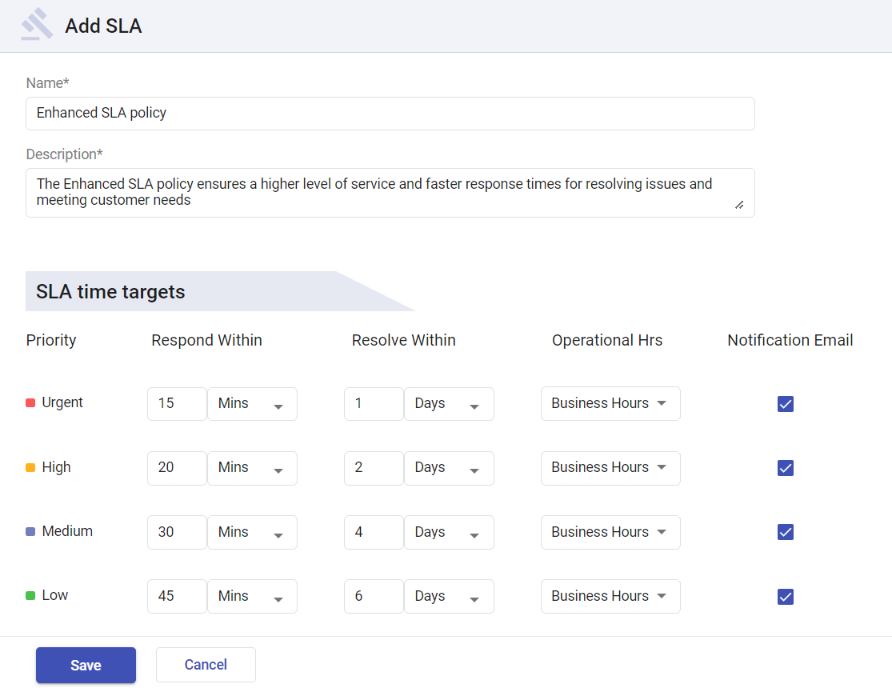
With helpdesk software, businesses can define their own SLA policies, specifying response and resolution times for different types of tickets based on their urgency and importance. By setting these standards, companies can ensure that support requests are handled in a timely manner, meeting or exceeding customer expectation.
Read more: Configure SLAs and apply them to tickets
9. Automation
By leveraging automation capabilities, businesses can optimize efficiency, reduce manual workloads for agents, make ticket handling easy, and deliver faster and more seamless support experiences to customers.
One of the key benefits of automation is its ability to streamline repetitive tasks such as ticket routing and categorization. The helpdesk system can automatically assign incoming tickets to the appropriate agents or departments based on predefined criteria, ensuring that inquiries are routed to the most qualified individuals for resolution.
By harnessing the power of automation, businesses can streamline their operations, save time and also minimize the risk of tickets being overlooked or mismanaged.
Read more: Configuring automation rules
10. Notifications
Amongst, the helpdesk features notifications play a crucial role in keeping both agents and end-users informed of new tickets, changes in ticket status, and other relevant updates, notifications ensure timely responses and facilitate seamless communication between all parties involved.
For agents, notifications provide real-time updates about new tickets assigned to them, changes in ticket status, and any other relevant information that requires their attention. This allows agents to prioritize their tasks effectively and respond promptly to customer inquiries, thereby enhancing overall support efficiency
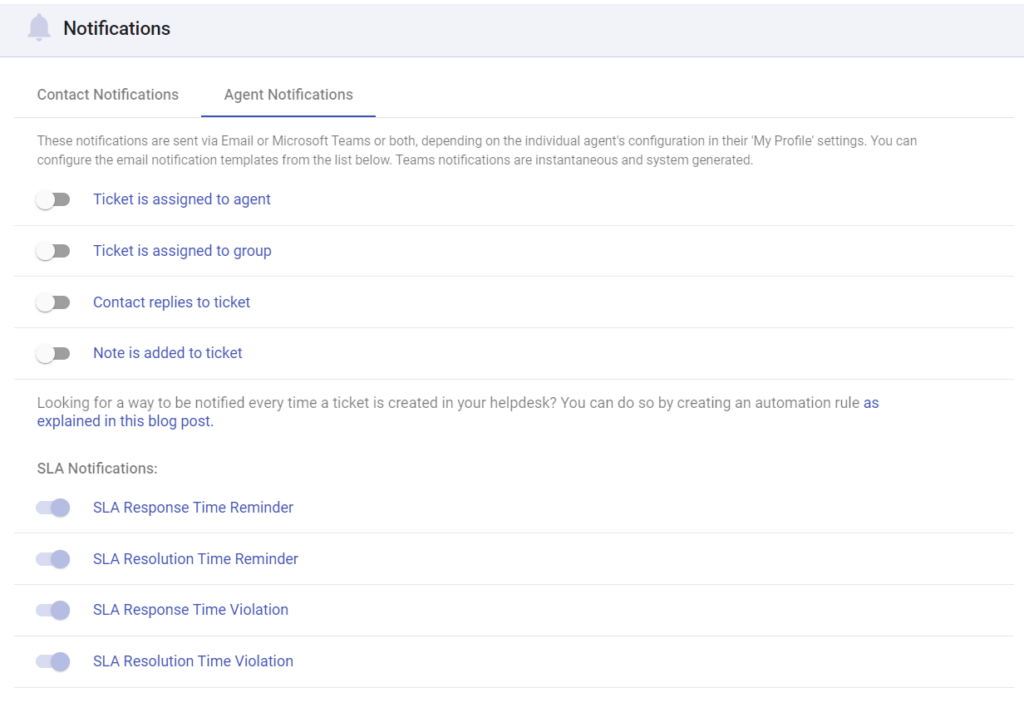
Similarly, end-users receive notifications about the progress of their tickets, ensuring transparency and keeping them informed about any updates or resolutions. This proactive communication fosters trust and confidence in the support process, ultimately leading to improved customer satisfaction.
Read more: How to Configure Notification Channels in Desk365?
11. Canned responses
Canned responses serve as a valuable tool to help agents manage this workload more efficiently. These pre-written responses allow agents to quickly respond to common or repetitive queries without the need to manually craft each response from scratch.
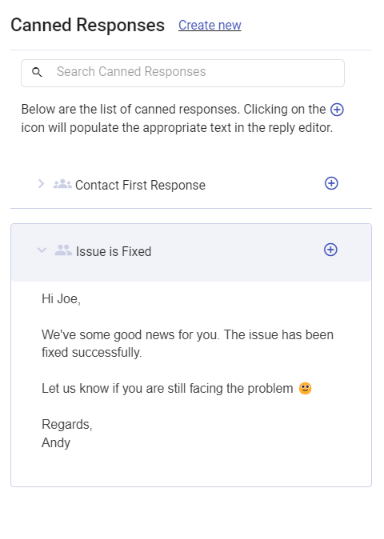
They are particularly useful for addressing frequently asked questions or handling standardized inquiries. By saving commonly used responses in a centralized database, agents can easily access and deploy them whenever needed, saving valuable time and effort.
Read more: Setting up Canned Responses
12. Third party integration
This feature allows seamless integration with various external tools and applications, enabling businesses to streamline their workflows and optimize efficiency.
By integrating with third-party tools, businesses can unlock additional functionalities and features that may not be available natively within the helpdesk software. This flexibility allows organizations to tailor their support processes to meet their specific requirements and adapt to evolving business needs.
Read more: Desk365’s integrations
13. Knowledge base
A knowledge base is an essential feature of any quality helpdesk. It serves as a centralized repository of information, enabling businesses to effectively manage and share knowledge both internally with agents and externally with customers for self-service.
Internally, the knowledge base provides support agents with easy access to a wealth of information, including user guides, troubleshooting tips, best practices, and more. Externally, the knowledge base serves as a valuable self-service tool for customers, allowing them to find answers to their questions and resolve issues on their own. A well-maintained knowledge base improves support efficiency, enhances customer satisfaction, and promotes self-service.
Read more: Setting up knowledge base articles
14. Reporting
The reporting feature offers a wealth of insights into various aspects of support performance, empowering businesses to make data-driven decisions.
One of the primary benefits of reporting features is their ability to analyze agent performance. By tracking metrics such as response times, resolution rates, and customer satisfaction scores, businesses can identify top-performing agents and areas where improvement is needed. This insight enables managers to provide targeted training and support, ultimately enhancing overall team performance.
Additionally, reporting features allow businesses to monitor ticket volume and trends over time. By analyzing ticket influxes, businesses can anticipate peak periods and allocate resources accordingly, ensuring timely responses to customer inquiries. Moreover, identifying trends in support requests enables businesses to proactively address common issues and implement preventive measures to minimize future occurrences.
Read more: Reports & Analytics
Choose the right helpdesk software for your team
Selecting the right helpdesk will help your team collaborate, automate, and prioritize interactions. Make sure you choose the best customer service software.
Consider the features each ticketing software offers carefully and find the best fit for your organization. Enhance your customer support experience and boost responsiveness with the powerful helpdesk software features.
Start your free 21-day trial today and discover how our helpdesk software can revolutionize your customer support process, drive efficiency, and deliver exceptional service to your customers.
Frequently asked questions
Helpdesk software is designed to manage customer inquiries and streamline support tasks, ensuring that every ticket or support request is efficiently tracked, prioritized, and resolved. It aims to boost customer satisfaction by making support operations smoother and faster.
Omnichannel support allows businesses to manage customer inquiries across various channels (e.g., email, chat, social media) in one place, ensuring seamless and consistent communication regardless of the customer’s preferred platform.
SLAs (Service Level Agreements) are commitments within helpdesk software to resolve support tickets within a certain timeframe, based on priority. They help ensure timely responses and meet customer expectations, directly influencing customer satisfaction.
Automation reduces repetitive tasks, such as ticket routing and categorization, by automatically assigning tickets to relevant agents. This speeds up response times, reduces errors, and enables support teams to focus on more complex customer issues.



